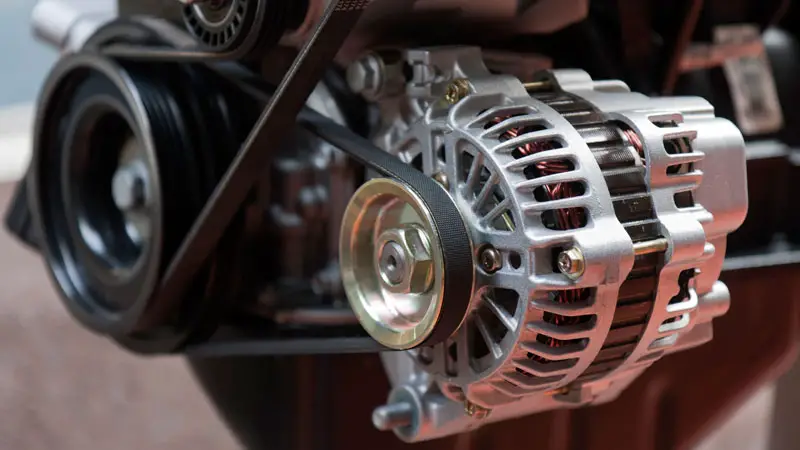Dealing with a dead car battery is never fun, especially when it seems to have drained unexpectedly. While it’s well-known that the alternator is crucial for keeping your battery charged while driving, can an alternator drain a battery when the car is off? This question often puzzles car owners, and understanding the relationship between the alternator and the battery is essential. Let’s dive into this intriguing topic and uncover whether an alternator can indeed drain a battery when the car is off.
Understanding the Alternator’s Role
The alternator is a critical component in your car’s electrical system. Its primary function is to convert mechanical energy from the engine into electrical energy, which charges the battery and powers various electrical systems while the car is running. When the engine is off, the alternator should not draw power from the battery.
The alternator works by generating alternating current (AC) and converting it into direct current (DC) to recharge the battery. It ensures that your car’s electrical components, such as lights, radio, and air conditioning, receive a consistent power supply. A properly functioning alternator should only contribute to charging the battery, not draining it.
How a Faulty Alternator Can Drain the Battery
While a healthy alternator helps keep the battery charged, a faulty alternator can lead to a drain on the battery. Can an alternator drain a battery when the car is off?This can happen due to several reasons, including a short circuit within the alternator, a faulty diode, or other internal electrical issues. When the alternator malfunctions, it can create a parasitic draw on the battery, even when the car is off.
A common issue is a defective diode. Diodes are responsible for allowing electrical current to flow in one direction only—from the alternator to the battery. If a diode fails, it can allow current to flow backward, causing a continuous drain on the battery. This situation can be challenging to diagnose without proper testing equipment.
Diagnosing Alternator Problems
Diagnosing alternator-related battery drain issues requires some technical know-how and tools. One effective method is to perform a parasitic draw test, which involves measuring the electrical current flowing from the battery when the car is off. This test can help identify whether the alternator or another component is responsible for the drain.
Using a multimeter, you can check the current draw from the battery. If the reading is higher than expected, it indicates that something is drawing power when it shouldn’t be. Further tests can pinpoint whether the alternator is the source of the problem. In some cases, simply disconnecting the alternator and observing if the battery drain persists can provide a quick answer.
The Importance of Regular Maintenance
Regular maintenance of your car’s electrical system can prevent alternator-related battery drain issues. Keeping an eye on warning signs such as dimming headlights, unusual noises, or dashboard warning lights can help you catch problems early. Scheduling routine checks with a trusted mechanic ensures that your alternator and battery remain in good working condition.
Maintenance also involves checking the condition of the alternator belt. A worn or loose belt can lead to insufficient alternator performance, which can indirectly affect the battery. Ensuring that the belt is in good shape and properly tensioned can enhance the alternator’s efficiency and prevent related issues.
Other Potential Causes of Battery Drain
While the alternator is a common culprit, other factors can also lead to battery drain when the car is off. Parasitic draws from electronic components, faulty wiring, and even old batteries can contribute to the problem. It’s essential to consider all potential causes when diagnosing battery drain issues to ensure a comprehensive solution.
Electronic components such as alarms, GPS trackers, or aftermarket installations can create a parasitic draw if not correctly installed or if they develop faults. Conducting a thorough inspection of these components and their wiring can help identify any hidden drains. Additionally, testing the battery’s health and replacing it if necessary can eliminate one variable from the equation.
Replacing a Faulty Alternator
If diagnostics confirm that the alternator is draining the battery, replacing the faulty alternator is the best course of action. While this might seem daunting, it’s a necessary step to ensure your car’s electrical system functions correctly. A new alternator will restore proper charging and prevent further battery drain issues.
When replacing the alternator, it’s crucial to choose a high-quality replacement that matches your vehicle’s specifications. Installing a subpar alternator can lead to recurring problems and additional expenses. Consulting with a professional mechanic can ensure the right part is chosen and installed correctly, providing peace of mind and reliability.
Preventive Measures to Avoid Battery Drain
Preventing battery drain involves a combination of good habits and regular maintenance. Ensuring that all electrical components are turned off when the car is not in use, keeping the alternator and battery in good condition, and addressing any electrical issues promptly can help avoid unexpected battery drains.
Being mindful of accessory usage, especially when the engine is off, can also conserve battery power. Simple practices like double-checking that lights are off and unplugging unnecessary devices can make a significant difference. Regularly driving your car and allowing the alternator to fully charge the battery can also help maintain its health.
The Role of Modern Car Electronics
Modern vehicles come equipped with an array of electronic systems that demand consistent power. These systems, while convenient and essential, can contribute to battery drain if not managed properly. Understanding how these electronics interact with your car’s battery and alternator is crucial for maintaining a healthy electrical system.
Features like keyless entry systems, infotainment setups, and advanced driver assistance systems (ADAS) can draw power even when the car is off. Ensuring these systems are in good working order and correctly configured can help prevent unnecessary power consumption. Regular updates and checks can keep these systems running efficiently.
The Impact of Driving Habits
Your driving habits can also affect the health of your car’s battery and alternator. Frequent short trips and stop-and-go driving can prevent the alternator from fully charging the battery. Conversely, longer drives allow the alternator to maintain the battery’s charge, ensuring it remains in good condition.
If you primarily use your car for short trips, consider taking it for a longer drive periodically to give the alternator ample time to recharge the battery. This practice can help offset the effects of short trips and keep the battery healthy. Additionally, avoiding leaving your car unused for extended periods can prevent battery drain.
Climate and Environmental Factors
Extreme temperatures can have a significant impact on your car’s battery and alternator performance. Cold weather can reduce the battery’s capacity, while hot weather can accelerate wear and tear on both the battery and alternator. Taking preventive measures during extreme weather can help maintain their health.
In cold climates, using a battery blanket can keep the battery warm and improve its performance. In hot climates, ensuring proper ventilation and avoiding direct sunlight can prevent overheating. Regularly checking the battery and alternator during extreme weather conditions can help catch potential issues early.
Signs Your Alternator Needs Attention
Recognizing the signs of a failing alternator can save you from unexpected battery drain and other electrical issues. Symptoms such as flickering lights, a dead battery, unusual noises, and dashboard warning lights should prompt immediate attention. Addressing these signs early can prevent further damage and inconvenience.
If you notice any of these symptoms, it’s essential to have your car checked by a professional. Early diagnosis and repair can prevent the alternator from causing more significant issues, such as a completely dead battery or electrical system failure. Keeping a close eye on your car’s performance can help you catch problems before they escalate.
The Importance of Professional Help
While some battery drain issues can be diagnosed and fixed with basic tools, more complex problems require professional expertise. Consulting with a trusted mechanic ensures that your car’s electrical system is thoroughly inspected and any issues are accurately diagnosed and repaired.
A professional mechanic can perform comprehensive tests and use specialized equipment to pinpoint the exact cause of battery drain. They can also provide valuable advice on maintaining your car’s electrical system and preventing future problems. Investing in professional help can save time, money, and frustration in the long run.
Conclusion
The relationship between the alternator and the car battery is vital for the smooth operation of your vehicle. While a healthy alternator charges the battery, a faulty one can indeed drain it, even when the car is off. Understanding the signs of a failing alternator and taking preventive measures can help maintain your car’s electrical system in top condition.
By staying vigilant, performing regular maintenance, and seeking professional help when needed, you can avoid the frustration of a dead battery and ensure your car remains reliable. So, the next time you suspect your battery is draining unexpectedly, consider the alternator as a potential cause and take action to keep your car running smoothly.

